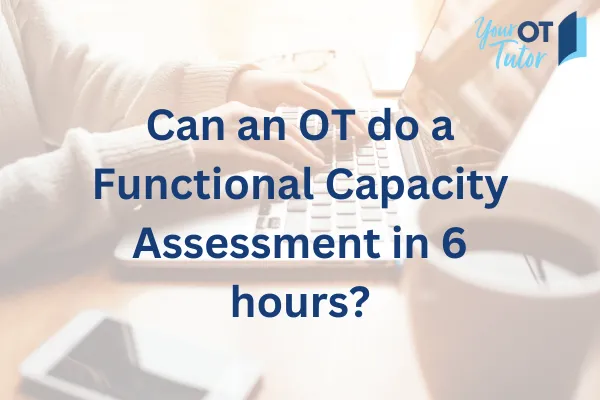THE YOUR OT TUTOR BLOG
Articles on important topics for occupational therapists...


Can an OT do a Functional Capacity Assessment in 6 hours?
There’s been a bit of a trend happening lately where OTs are being asked to complete a full Functional Capacity Assessment for an NDIS participant in only 6 hours. What do we think? Is this achievable?
I’m going to say something unexpected here…Yes – we can complete them in 6 hours. But if we do, it will be because there are some special circumstances, and not all of them are good.
Keep reading to find out what they are, and what you should be doing the next time you’re asked to write an FCA (or deliver any NDIS service) when there is insufficient funding.
Four reasons why an OT can complete an FCA in 6 hours
I’ll start with the reasons for how an OT may be able to complete this seemingly impossible feat.
1. The information gathering is already done
A big part of 10-15 hours typically required for a full FCA process is the information gathering. Often it’s half the total time. It involves interviews, observations, reading other reports and liaison with carers and other professionals. If the FCA is being written by an OT who has been working with the participant for capacity building sessions for a while (e.g. working with a young adult to build meal preparation skills, or working with another participant to prescribe a list of assistive technology), chances are the majority of that information gathering will be done. They’ll know exactly what the participant needs, and maybe they just need to update some standardised assessments. They may already have existing plan review reports or AT applications for that participant where they can pull out information and paste it into the FCA. Now a 6-hour FCA is feasible because it’s just 6-hours of report writing, some of which may already be done.
2. They are nailing their niche
Some experienced OTs may have chosen to work in a super niche area. There’s not a lot of variation between the type of clients they see, so the assessment tools, research evidence and justifications they are including in their FCA are similar between participants. They have probably invested time in working out the quickest way to gather the information they need. They have also probably got super-efficient templates that don’t need much tweaking between participants. Perhaps they are using AI to assist with polishing off their report writing, and they have invested time and brain space into knowing what prompts will guide the AI to write how they want the report written.
Remember I also said they are experienced, and working with a caseload without much diversity; this means they know their clinical reasoning inside out and back themselves 100% on every decision they make. No time wasted second guessing themselves or checking for research evidence updates or NDIS trends for each participant; they are living it every day. With this sort of efficiency and confidence, maybe a 6-hour FCA is possible, for a participant without complex needs.
3. They don’t know what they don’t know
Now while the last reason is based on super-human OT skills, this is the opposite. Some inexperienced clinicians could be pumping out FCAs in 6 hours because they don’t appreciate the depth that is actually required. They don’t realise an OT FCA for an NDIS participant needs to follow a certain format, include detailed evidence, and be written in plain language that an NDIA planner understands. So instead, they’re doing a much shorter, simpler OT initial assessment report. But unfortunately, this isn’t going to get them the funding they need.
Maybe they do know the NDIA requirements, but their clinical reasoning is still developing. So they do a surface level assessment focusing on what the client or referrer reports about their function, while undervaluing the importance of their own observations, and the need for activity analysis to inform their recommendations. Then they dump the superficial information into AI and it spits out a report that may read well, but in fact is all fluff and doesn’t meet the specifics an NDIS report needs. But they don’t know this, because they don’t know what ‘good’ looks like.
4. They are undercharging
I suspect this is probably the main reason why you may see an OT only bill 6 hours for an FCA. OTs who have billed this timeframe are often doing so due to unrealistic expectations set by companies that 6 hours is the standard, often driven by a competition to gain referrals over other providers. Or they’ve been gaslit into thinking anything more than 6 hours indicates a problem with their skill level; it’s something they have to improve and so they feel they shouldn’t be billing for their learning. Making price accommodations if extra time is needed for learning is reasonable, but only if it’s true. If no-one but a superhuman OT could complete the FCA in 6 hours, that shouldn’t be the benchmark you set.
Sometimes the reason we undercharge is because the participant just doesn’t have the funds to pay us. We know they’ve run out, but they are still desperate for support in the next plan, and we know the only way to get this is to put together a good FCA. Yes, the total invoice may be 6 hours, because that’s all the funding they had left, but in reality the OT has spent much longer to pull together the quality report they can be proud of.
So then what’s the answer?
Unfortunately, there is no easy solution. Participants will continue to run out of funds. The NDIA will continue to gaslight us into thinking our skill level must be the problem, not the ridiculous hoops we jump through to try to meet everchanging goal posts that take time and brain-space. And while niching to a narrow caseload may seem like something to aim for, it’s not realistic for many (e.g. it’s not going to viable in a rural area where you need to do a bit of everything!). AI also isn’t the answer; it can speed the process up, but you still need to do comprehensive information gathering (this takes time!) and you need to know what good looks like.
Here are my suggestions for what to do to get efficient at FCAs, but to also charge for the time you reasonably spend:
1. Invest in training and supervision to build your competence and confidence – I have plenty of options on my website 😉
2. Fix your templates! Broken formatting or re-typing common descriptions (e.g. standardised assessment descriptions) wastes time.
3. Ask for feedback. Get a senior OT to read your reports, but also get feedback from experienced support coordinators who know what ‘good’ looks like in terms of success in a planning meeting (although I know, there is no consistency whatsoever here!).
4. Follow-up your reports. The typical response from the NDIA now is often ‘just say no and see if they fight it.’ Often the detail in your report is there, it just needs to be pointed out. If you are following up your report, you’ll be there to do that, rather than another OT needing to spend hours extra starting from scratch.
5. If you choose to do unpaid work to reach the quality you can be happy with, make sure the participant knows you have done pro-bono work. Tell them. Write it on the invoice. Write it in the report so the NDIS knows too. Sometimes we will choose to do it, but we shouldn’t let everyone think that a 6-hour FCA is the norm. Otherwise that is all the NDIS will give us. And those who charge anything more will be thought of as greedy over-chargers. It doesn’t help you, the profession, or ultimately your participants either. Only the NDIA will win.
If you’re still reading, hopefully you found this helpful. Maybe it validated that a 6-hour FCA is not realistic. Maybe it gave you some ideas to increase your efficiency or the quality of your work. But at the very least, hopefully it prompted you to reflect on the value you are actually providing, and to bill for your time wherever you should be.
P.S. If you’re looking for help with your FCAs or NDIS report writing, there is plenty on the Your OT Tutor website here: https://yott.au/learninglibrary-ndistraining
But if you’re an OT who wants to be a better OT who loves what they do, not just an OT that can tick NDIS boxes, check out my CPD memberships. YOTT Alliance is for experienced OTs, while YOTT Connector is for new grads and students.
If you found this newsletter helpful, make sure you subscribe and ring the bell on my profile so you’ll be notified whenever I put up a new post. Also check out the Your OT Tutor website and subscribe to the mailing list or sign-up for the Learning Library – there are heaps of resources, courses, and CPD opportunities, with more being added regularly.
#OccupationalTherapy #NDIS #YourOTTutor






